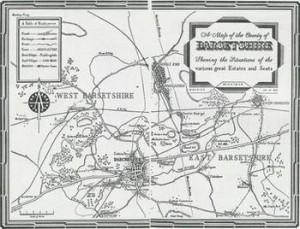One of the underappreciated sidelights of having grown up in Southern California was seeing bits and pieces of it masquerading (sometimes quite unconvincingly) as someplace else on TV. You may know, for instance, that all those times on the original Star Trek that Kirk and Spock set down on a planet where they actually went out to a real non-studio set location, it always seemed to be an area north of the San Fernando Valley called Vasquez Rocks. The area is distinguished by all the rocks being round, from the largest boulders down to the tiniest pebble, which makes the place look quite weird and unearthly… but embarrassingly distinctive. If the location sports scrubby chaparral and all round rocks, they’ve been out to Vasquez Rocks again, no matter what the show is and what the plot calls for.
I don’t know how many times I saw the same stand of papyrus swamp at the County Arboretum standing in for some Third World pretense of a nation on Mission Impossible, which along with Fantasy Island always made good use of that ornate little white cottage with the porches all the way around. It’s the guest cottage on the old Lucky Baldwin estate, and I don’t care how big you think it looks on TV, it actually is only about the size of a two car garage, and has only four teensy bedrooms.
Other fortuitous spottings included seeing the Oviatt Library, on the campus of Cal State Northridge (a facility in which I practically lived for two years) masquerading as a Cylon installation on the original Battlestar Galactica. The Fine Arts facilities at Cal State Northridge also doubled regularly on Medical Center as (wait for it) a medical center. Stumbling over a production crew doing exterior shots was just one of the advantages of an education there. I also once spotted a corner of Foothill and Commerce in Tujunga pretending to be some little town out in the sticks in Lou Grant, and recognized it only because it was close to my bus stop. And when the 210 Freeway was being built in sections, a particular two or three mile stretch of it through La Crescenta and Tujunga was about the last to link up with the other stretches. This made it a popular venue for chase scenes, especially for CHIPS, the notorious Erik Estrada vehicle. They would film a hell-for-leather car chase up one side of that stretch…. and in mid-chase, suddenly be going hell-for-leather in the other direction.
There were a lot of car chases inexplicably changing directions; I recall another one along Roscoe in Sun Valley, which spun into the parking lot of a large Hispanic grocery store, and went back the way it came. If you’re blocking off a goodly length of street, it only makes sense to use both sides of it, but it still gave fits of the giggles to people who knew the area. The rattle-snake ridden cottage where JP and I lived as small children was once used for a week as a location set, to the great amusement of my parents. So far out in the hills, and isolated from other houses, it made a perfect hideaway for an escaping gunman on the old Highway Patrol series… and the leftovers from the generous catered meals on the set augmented the food budget rather nicely, as Dad was in graduate school at the time. Mom and Dad said for years afterwards that the sheer amusement value of watching Broderick Crawford’s male nurse keeping him away from the alcohol more than made up for the inconvenience of lights and cameras, and having to keep quiet and out of the way.
When I began to travel, I became even more sadly aware of just how much the usual locations didn’t look anything like the places they were supposed to be: Korean hills, for instance, were jagged and steep, and bright green in summer, not rounded and dull green, as they appeared on MASH. Spotting a eucalyptus tree in what was supposed to be the Normandy countryside wrecked otherwise carefully constructed believability, just like seeing California live oak trees in the alleged mid-West. Southern California could pass convincingly as the Mediterranean, though — given the right sort of background architecture. Greece, Southern Italy, Southern France, and Spain any place where olive trees and oleanders thrive could be duplicated in So-Cal. Provence and the Pellopponese felt halfway familiar to me on that basis; that and the propensity for brush fires.
Eventually TV producers tried harder (either that or to save money) when it came to locations. They might not have gone all the way to Alaska to do Northern Exposure, but at least they went farther than the San Fernando Valley. Audiences may be savvier, too; I am sure lots of other people recognize Vasquez Rocks, too. But there is still the thrill of recognizing a location when watching a vintage television show … most especially when it was supposed to be someplace else.



Recent Comments